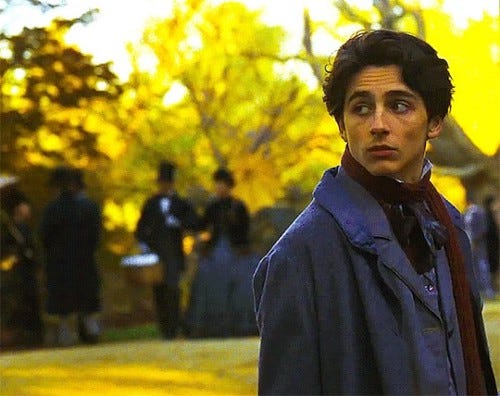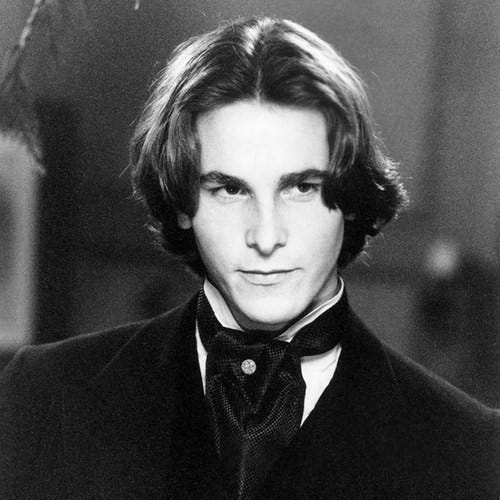Why Jo and Laurie Don´t End Up Together, Falling In Love With The Idea of Love
and why the film-makers like to ignore it
Two very different proposals
A lot of the relationship between Jo and Laurie was based on mutually reinforcing ideas of toxic masculinity. Eventually, this turned out against both of them. In Jo´s case, it made her lose the trip to Europe and in Laurie´s case it brought out his temper and more possessive behaviour. The best example of why Jo rejected Laurie´s proposal and why she did fell in love with Friedrich is to examine the two proposals. When Laurie proposes to Jo he says he loves her because Jo has always been so good to him. He doesn´t love her because of her personality or her ambitions. Jo had a tendency to mother Laurie and we can probably explain this with the fact that the young men who were inspirations for Laurie´s character were much younger than Louisa. Being a maternal figure was something that came naturally to Jo. In a way, March´s adopted Laurie to be part of their family unit. That Jo sees Laurie as her brother makes perfect sense and sisters often become pseudo-mother figures to their brothers. In movies, we only see Laurie´s pain but we never see the pressure he puts on Jo or how uncomfortable his actions make her feel. When we read the book and see Laurie´s character through the movie´s lens it perpetuates the idea that the controlling behaviour he has in the books doesn´t matter and it is a sign of love. Yet the book Laurie is not in love with Jo. He is in love with the idea of love.
Laurie´s story and his character arc in Little Women are not about Amy or Jo. It´s a story about how Laurie becomes a man.
This is what Laurie thinks about girls:
“I’ve tried to show it to you but you wouldn´t let me. Now I am going to make you hear and give me an answer for I can´t go on any longer”
“But girls are so queer you never know what they mean. They say no when they mean yes, and drive a man out of his wits just for the fun of it”’
Laurie seems to be thinking that Jo would fall in love with him because that is what girls do. If we take a look at the narrative of the first book. Laurie has said similar things as a teenager. Things like “someday I´ll get you Jo” is quite a possessive thing for a 15-year-old boy to say and it highlights how much the two have fed each other with harmful stereotypes about gender roles. Now that they are adults Jo feels the need to leave this toxic cycle. Not just because of her own sake but also Laurie´s sake and it is toxic because up until that point Laurie has been told what to do by Jo, John Brooke or by his grandfather. Laurie wants to keep the status quo of their relationship so that he does not need to grow and take responsibility for himself or his own actions. Laurie was not used to making decisions. Marrying Jo is an easy escape from his life remaining the same rather than different as it is meant to be.
Most adaptations have also chosen the easy escape by not showing the slow and painful work of the personal transformation that Laurie does go through in the books. If we now take a look at the narrative of the second book. There are no glimpses inside Laurie´s head where he would be thinking about Jo or dreaming about the future with her. When Jo leaves New York we do get a glimpse inside Friedrich´s mind and he does admit to himself that he is indeed in love with her and he wonders what life with Jo would be like. Laurie´s actions in most parts of the second book don´t make any sense because Laurie´s mind is a complete mess.
When Jo rejects Laurie we should be on Jo´s side. Yet in 90% of Little Women adaptions, Laurie´s character arc is missing. He doesn´t have a temper (or character arc) in 1933, 1949, 1994, 2018 and 2019 films. Series from 1950 and 2017. Little Women musical and or in Japanese anime.
Almost like the lack of Laurie´s inner thoughts the book is telling us that Laurie hasn´t thought things through. This is another contrast between Laurie´s shallow idealized dreaminess and Friedrich´s deeply grounded reality (@this-thrown-out-gentleman).
Jo is honest with Laurie. She sees that if she would marry him their arguments would escalate to violence. Laurie´s relationship with Jo is more codependent.
Laurie wants to keep the status quo of their toxic relationship and it is toxic because up until that point Laurie had been used to do by Jo, John Brooke or his grandfather. He wasn´t used to making decisions (@renee561)
Trying to threaten someone you say you love is never a good idea. Instead of seeing any fault in his own actions, Laurie blames it on someone else and he wants Jo to feel guilty for rejecting him. Then he guilt trips her even more by saying that she will marry someone and that she will be a silly woman by going back on her word of never marrying. Jo has a brilliant response but Laurie doesn´t want to hear it.
Then Laurie threatens to go to the devil and behaves like a 19th-century brat boy. Laurie´s proposal has been traditionally abridged or the dialogue has been changed. In the adaptations, it has been portrayed to be a romantic scene when in the books it is a conflict. Little Women is often a misunderstood book because it does something very unique and powerful. Laurie´s proposal was never about Jo. It was all about him.
It is still all about him and he still wants Jo to feel guilty. Thank god for the grandfather (this is good parenting). Six months later Amy meets Laurie in Europe and they have not met for four years. Amy finds him changed and different. She scolds him and his attitude but it comes from a good place because Amy knows that Laurie has the potential to make the most of his life and when she carefully asks what happened between him and Jo…
Still all about him. Not about Jo.
Amy´s lecture did Laurie good though of course, he did not own it until long afterwards. Men seldom do for when women are advisers. The lords of the creation won’t take the advice until they have persuaded themselves that it is just what they intended to do. Then they act upon it and if it succeeds they give the weaker vessel half the credit of it. If it fails they generously give her the whole. Little Women Chapter 41.
Amy´s words start to affect Laurie yet in his mind Laurie thinks that Amy´s advice was unnecessary and that he had always meant to do something. Laurie´s biggest flaws are his pride and vanity but also his lack of ability to put himself in another person´s position and this is why his growth process is slow and painful. Still, at this point, Laurie doesn´t see women as individuals. He sees himself above them. In Vienna, he starts to compose an opera that would harrow Jo´s soul and melt her heart. Once again it´s all about him but the opera doesn´t go that well. He wants to capture his romantic passion and all things that come to mind are Jo´s oddities, faults and freaks.
Romantic or creepy?
The moment when Laurie caught himself thinking the word “brotherly” and Jo it is almost like he sees himself as a character in an opera he is trying to compose. He immediately sends Jo a letter and proposes to her again. Once again it is all about him and not about Jo. Proposing someone right after they have lost their sister is not a good idea. When Jo´s response arrives and she still says no Laurie feels relieved but instead of feeling bad for guilt-tripping her for quite a long time he wants to cherish his memory as being a tragic romantic hero. It is still all about him. Why was Laurie so obsessed and why he never listened to what Jo had to say and why he felt guilty when he started to develop romantic feelings towards Amy? since we know Jo never cared about him like that. As being said there are no scenes in the books where Laurie is thinking Jo romantically or dreaming about a life with her. All his dreams are really about seeing himself as a romantic hero. Laurie feels guilty because his love for Jo is mainly grateful. She invited him to be part of their family. Something that Laurie was always lacking. Thanks to the over the top ideas of masculinity he and Jo fed to each other Laurie didn´t learn to respect women.
We should not ignore Laurie´s background
In terms of Little Women Louisa did not write an explicit background story for any of the male characters. From the little that we know from Laurie´s background it would seem that when he was a child he was tossed from one boarding school to another and he did not have any stable parental figures or that he never spent enough time in one place to be able to establish such relationships. Quite early in the novel, Laurie admits to Jo that he feels envious of the sisters bond to their mother.
Laurie´s and Jo´s relationship is characterised by childhood innocence. Jo represents the nurturing feminine presence Laurie was craving to have in his life at the same time Laurie is a brothernal figure for Jo who compliments her views on non-conformity (Ajedisith)
Jo and the March family become a refuge of stability to Laurie. It is only when he moves to Concord at the age of 15 for the first time he is surrounded by people who stick long enough to put boundaries and try to raise him. More than often Laurie was frustrated by Jo´s lectures but at the same, he was depending on them.
Falling in love with the idea of love
Little Women is a semi-biographical novel. We can trace Laurie´s actions to Louisa. Same way as Laurie Louisa´s childhood was unstable and turbulent and the family moved very often. When Louisa was young she had a big crush to the family friend and next-door neighbour philosopher Waldo Emmerson. Emmerson was also one of the many men who were inspirations for the character of Fritz. More than often Emmerson saved Alcott´s from troubles and he became a symbol of stability for Louisa the same way as Jo is for Laurie. Louisa became obsessed with German female writer and social activist Bettina von Armin and her book Goethes Briefwechsel mit einem Kinde (Goethe´s correspondence with a child). Which included love letters Bettina wrote to the poet Goethe.
Bettina represents herself as a lover. A role that is traditionally seen as more masculine (Kundera). Bettina was in love with the idea of love. Love is an emotion. Not as a love relation. In her letters, she does not ask his opinions or shares ideas with him.
“I turned myself into Bettina and made Emmerson my Goethe” — LMA
Laurie is not in love with Jo. He is in love with the idea of love. It is about putting up on a role and a narcissistic one for that when it hurts other people. This is exactly what happened between Jo and Laurie and Bettina and Goethe. Let´s call Laurie´s behaviour with its actual name, harassment. When Louisa was an adult she did tell Emmerson how she had built this romantic fairytale scenario in her head. Emmerson himself had been completely unaware of it. Nevertheless, they had a very strong friendship throughout their lives (Reisen).
There is the famous Little Women passage to adulthood ritual (which would make a really interesting research topic to gender studies). It basically means that a reader who has read the book as a child and romanticized Jo and Laurie and quite possible watched the 1994 film more than once. Reads the book as an adult and finds out that Laurie was very childish and he and Jo were very ill-matched and they move on to root Jo and Fritz or Amy and Laurie or both. We can also see it as a metaphor for how a person develops a mildly delusional obsession over another. Especially young boys and girls think that their life only has a meaning when they find a partner whose only reason for existing is them but it is not healthy and not love. When you truly love someone you love them for what they truly are. Not the way you want to see yourself with them. In Little Women, Laurie himself is the one character who goes through the Little Women passage of adulthood ritual. It is not until he goes through the process of self-growth and begins to see the women in his life as what they really are, he is truly able to love someone.
Friedrich´s proposal
Friedrich´s proposal is the complete opposite. Fritz wants to tell her how he feels about her and let her decide. After Jo has left New York they have been writing letters to each other and when he comes to see Jo in Concord he hopes to see signs of love from Jo and when he reveals to her that he has gotten a job and he is going to the west Jo´s walls go down.
He gives Jo all the power and control and he lets her know that everything that she feels and thinks is important for him and he wants to make sure that she returns to his feelings and that their lives and goals work together. He is not even making a marriage proposal. He is asking if she could love him. In comparison to Laurie Friedrich´s screen portrayals are always closer to the books, even if most of his parts are left out because he is a less romanticized character. He also acknowledges his flaws in the same way as Jo does. In terms of Friedrich´s narrative, Little Women is also about identity but in his case, it is not about forming identity but when he falls in love with Jo he reshapes his already existing identity.
Friedrich as Goethe
Louisa was a great admirer of the German writer and poet Goethe. A lot of research has been made on Goethe´s influence on Louisa´s writings. For example, a long fatal love chase has many parallels with Goethe´s Faust. But less research has been done between Goethe´s writings and Little Women. Goethe was one of Louisa´s favourite authors and she credited him to be the one author who has taught her the most about creating and understand characters. Her copy of Wilhelm Meister´s Apprenticeship was given to her by Waldo Emmerson (and Louisa filled it with scribbles and took notes). In Little Women Friedrich gave Jo a copy of Shakespeare´s work and through that Jo learns how much more there is to find out about storytelling. Fritz also encourages Jo to study people around her so that she becomes better at developing and creating characters. Goethe was one of the biggest inspirations for Friedrich´s character which shows again, how Louisa wrote Fritz to be her own ideal man.














